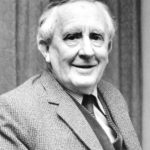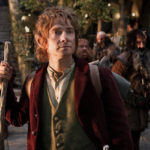The Making Of A Myth, Part 4
In church Sunday we sang Michael W. Smith’s “Shine On Us” which contains these words:

Lord
Let your light, Light of your face
Shine on UsThat we, may be saved
That we, may have life
To find our way
In the darkest night
Let your light, Shine on us
When we got to the part “To find our way/In the darkest night” I got this vivid image of Frodo Baggins holding up his gift from Galadriel, a Phial filled with the light of the star Earendil, and heading into Shelob’s lair.
In church? During worship? Indeed. And the image was so powerful, so clearly allegorical, so transitional to what God provides spiritually, that I teared up and could hardly continue singing.
J. R. R. Tolkien had given me a gift — an image that came out of nowhere and impacted me with its truth. Except, it didn’t actually come out of nowhere. It came from Tolkien’s sub-creation, the fantasy — the combination of imagination and enchantment — that is not part of the Primary World, as he called this world in his essay “On Fairy-Stories.”
I suspect Tolkien didn’t intend his light of the star Earendil to undergird the theology of God’s grace, but that’s what the image and the song in combination inside me ended up doing, and my experience illustrates Tolkien’s own belief about fantasy:
Fantasy . . . is, I think, not a lower but a higher form of Art, indeed the most nearly pure form, and so (when achieved) the most potent.
I’m not aware of Tolkien talking a great deal about what his stories meant. He insisted that they weren’t allegories (at the time, critics were saying they represented the war against Germany) and that they weren’t derivative (they accused him of co-opting the premise of Richard Wagner’s four epic operas comprising the Ring Cycle). He even said at one point that the Lord of the Rings was a very Catholic work, but what exactly did he mean?
One thing I would postulate from what he said about fantasy is that he believed his stories revealed true Truth.
Fantasy is a natural human activity. It certainly does not destroy or even insult Reason; and it does not either blunt the appetite for, nor obscure the perception of, scientific verity. On the contrary. The keener and the clearer is the reason, the better fantasy will it make. If men were ever in a state in which they did not want to know or could not perceive truth (facts or evidence), then Fantasy would languish until they were cured. If they ever get into that state (it would not seem at all impossible), Fantasy will perish, and become Morbid Delusion.
Fantasy’s drawback, Tolkien believed, was that it was hard to pull off. The necessary element was “the inner consistency of reality.” Anyone could conceive of a green sun, for example, but to do so and to do nothing else with it was gimmicky. A world with strangeness and no inner consistency was underdeveloped. Instead, the writer as sub-creator needed to draw upon the ramifications to the secondary world (the one of fiction) of a green sun.
Tolkien also recognized that fantasy could be misused.
Fantasy can, of course, be carried to excess. It can be ill done. It can be put to evil uses. It may even delude the minds out of which it came. But of what human thing in this fallen world is that not true? Men have conceived not only of elves, but they have imagined gods, and worshipped them, even worshipped those most deformed by their authors’ own evil. But they have made false gods out of other materials: their notions, their banners, their monies; even their sciences and their social and economic theories have demanded human sacrifice.
I couldn’t help but think of Phillip Pullman’s His Dark Materials as an example of fantasy put to evil use. But Tolkien is right — other kinds of stories are as susceptible to misuse. And yet, if fantasy is powerful when done as sub-creation with internal consistency, readers are not merely transported to the secondary world, they live in that world and experience with the characters their conflict and their overcoming or their faltering and failing.
Of course readers can “live” in a fully realized fictional world containing nothing of fantasy, so sub-creating isn’t unique to the genre. What is unique, however, is the enchantment that transports a reader to that place of Other. As close as I can explain it, I think it touches the spiritual, pulls the veil back and gives a glimpse of glory or of shame. At least that’s been my experience, one that stays with me and surprises me at the most unpredictable moments.









































Amen! I especially agree with the quote about fantasy becoming morid delusion, because it seems certian subgenres *cough* paranormal romance *cough* are heading that way, if they are not there already.
Tolkien was one astute dude, wasn’t he? I mean, he recognized the pitfalls, and he knew human nature. Funny thing, though. I just read an article about him with quotes from some of his students. If they reported accurately, he wasn’t a very good teacher. Hard to imagine how he knew people so well and yet was apparently so preoccupied with his lecture that he forgot his students. Go figure!
Becky
This sounds good in theory, but–what fantasy?
Robert Jordan and the Wheel Of Time It Takes To Finish? The oodles of Dragonlance trilogies? Terry Brooks? The Dresden series? George R. R. Martin? Robin Hobb?
They all have their merits, but I’d hardly call them transcendent. And I’ve found no Christian authors who can compare to really good secular authors.
There’s always George MacDonald and other dead authors, I suppose. But people don’t write like that anymore.
Sorry for coming across as such a cynic. I’d just like to see some practical examples of this sort of fantasy, because I have yet to find any of this caliber.
Kessie, Tolkien is right that fantasy written as he described is not easy. Some writers have emulated his work, and perhaps the morality of their story is in place, but others are created that fit his description of fantasy put to evil use.
Where are the stories that reach the caliber of Tolkien’s opus maximus? I think there are writers who want to reach his level without writing an updated version of his work, so who knows, it may be out there waiting for us to find it.
Some Christian writers I know off the top of my head who have written or are writing sub-created fantasy include Karen Hancock (the Guardian-King series), D. Barkley Briggs, (the Legends of Karoc Tor), Andrew Peterson (the Wingfeather Saga), Brian Polivka (the Trophy Chase trilogy), Sharon Hinck (the Sword of Lyric series), Jill Williamson (the Blood of Kings series). These are all better than average, I think. They could hold their own against many a secular novel, and I think one or two or three are a step away from “breaking out” — really catching the notice of the public because of the quality of the writing and the grandness of the story.
Sadly, in some cases the publishers are funneling the talents of their writers into something different, something they view as more marketable.
Becky
And don’t forget Jeffery Oversteet’s Auralia’s Thread series. Gorgeous books, really.
Good add, Galadriel/ I know Jeffrey Overstreet has a good number of fans. His strength, in my way of thinking, is his beautiful prose, but he also built a unique and believable place where a reader can submerge herself.
Becky
[…] in a short two-part series of posts, and yet the topic came up again in my article yesterday at Spec Faith. Consequently, as I read some of the tour posts about Corus The Champion by D. Barkley Briggs […]
From Becky:
Sometime recently, in another Spec-Faith discussion, Kaci Hill and I were mentioning how such fantasy-borne images will often come to mind during church worship. I think our agreement was that these haven’t been distractions from worship so much as a momentary lapse into a different form of worship. In this case, then, what made you tear up? Something apart from being enamored with the wonders of God? No, it sounds like it was Tolkien’s image, which itself reflected His glory, that “got” to you.
Interestingly enough, I just received Michael W. Smith’s instrumental album, Glory, today. While I appreciate many of his contemporary songs, I believe that if he were to spend the rest of his life on Old Earth making this kind of music, we’d all be blessed.
Until now, I haven’t been familiar with that particular song, though.
(Clears throat.)
Well … American-evangelical pragmatism, and all. “Whatever works,” to teach morality / get ’em saved / make ’em feel comfortable … (Yanks out ongoing rant by its roots.)
Also from Becky:
Then from Kessie:
If true, maybe they’re instead really good teachers … ?
It was the picture from fantasy that illustrated the words which perfectly described life. It was an incredible unification of art and reality pointing to truth — definitely not a distraction, though I admit, the epiphany, for lack of a better term, was quickly followed by a bit of amazement because I am not currently reading Lord of the Rings (though that might change), nor had I recently seen the movies. Yet there it was, from somewhere buried in my subconscious, right to the front of my thinking, stirred by the music that seemed to belong with the image. And together they shouted the truth that the light of God’s face, that His grace, shines in the darkness I experience.
See, I had an impossible circumstance I’d put in God’s hands, and He used a Christian friend to deal with the situation. What had been darkness, impossibility, became light and joy and gladness and celebration and singing, but until the song and the remembrance of the Frodo scene, I hadn’t completely processed God’s amazing goodness, the way He planned before time how He would not only save me but rescue me in the circumstance I faced. His love and grace sort of poured over me, overwhelmed me.
Good line, Stephen, about the really good teachers. 😆
Becky